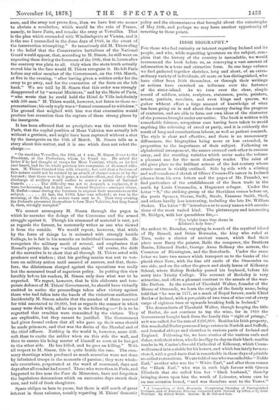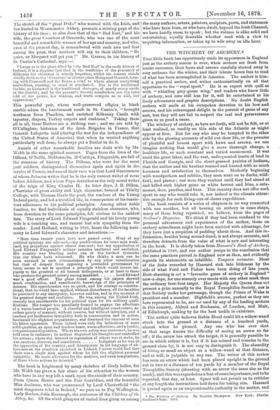IRISH BIOGRAPHY.* Fon those who feel curiosity or interest regarding
Ireland and its people, and who, while regretting ignorance on the subject, com- plain that the history of the country is unreadable, we would recommend the book before us, as conveying a vast amount of information in a terse and attractive form. In one large volume we find gathered together sketches, long and short, of an extra- ordinary variety of individuals, all more or less distinguished, who have either been Irish themselves, or through their writings or actions have exercised an influence over the fortunes of the sister-island. As we turn over the clear, simple record of soldiers, saints, sculptors, statesmen, poets, painters, actors, patriots, novelists, and even kings and queens, we gather without effort a large amount of knowledge of what has been going on in and about the country during the progress of centuries, and are able to form our own ideas of the character of the persons brought under our notice. The book is written with remarkable fairness, scrupulous care having been taken to avoid anything like colouring of creed or party, and it is evidently the result of long and conscientious labour, as well as patient research. The style is clear and effective, and there is no unnecessary diffuseness, the biographies being more or less extended, in proportion to the importance of their subject. Following an alphabetical arrangement, the names succeed each other in curious array, and the startling varieties which occur make the volume a pleasant one for the most desultory reader. The saint of old gives place to the brilliant actress of the last century whose erratic career is vividly outlined. Side by side with a stirring and well-condensed sketch of Oliver Cromwell's career in Ireland (drawn from his own letters and the pages of Mr. Fronde), we find particulars of the establishment of the linen trade in the north by Louis Crommelin, a Huguenot refugee. Under the letter " S," the striking group of the Sheridans comes before us, the poets Spenser, Sterne, Swift, Steele, Erasmus Smith, Shell, and others hardly less interesting, including the late Dr. William Stokes. The letter "B " introduces us to many names with associa- tions of the most varied kind. The picturesque and interesting St. Bridget; with her quenchless fire,—
The bright lamp that shono in
Kildare's holy fano ;"
the ardent St. Brendan, voyaging in search of the mystical island of Hy Brasail, and Brian Borumha, the king who ruled at Tara, make a cluster of ancient names, which find their place near Barry the painter, Balfe the composer, the Brothers Banim, Edmund Burke, George Anne Bellamy the actress, the Countess of Blessington, and the Beresfords. Under the same letter we have two names which transport us to the banks of the placid river Nore, with the fine old castle of the Ormondes on one side, and on the other the green and shady lawns of Kilkenny School, where Bishop Berkeley passed his boyhood, before his entry into Trinity College. The account of Berkeley is very attractive, and offers a pleasant contrast to the annals of the war- like Butlers. In the record of Theobald Walter, founder of the House of Ormonde, we learn the origin of the family name, being told that " be was in 1177, as a mark of Royal favour, made Chief Butler of Ireland, with a perquisite of two tuna of wine out of every cargo of eighteen tuns or upwards breaking bulk in Ireland."
The descendants of Theobald Walter, though keeping the title of Butler, do not continue to tap the wine, for in 1810 the Government bought back from the family this " right of prisage," as it was called, for the sum of £216,000. Besides his Irish property, this wonderful Butler possessed large estates in Norfolk and Suffolk, and founded abbeys and churches in various parts of Ireland and England. Following his, we have stories of the various earls and dukes, with their wives, who lie in effigy to-day on their black-marble tombs in St. Canice's fine old Cathedral of Kilkenny, which Crom- well turned into a stable for his horses, and which has lately been re- stored, with a good-taste that is remarkable in these days of pitiable so-called restorations. We are told of one who was called the " Noble Earl," another who was the " White Earl," and after them comes the " Black Earl," who was in such high favour with Queen Elizabeth that she called him her " black husband," thereby bringing down upon him the wrath of Leicester, whose ears he on one occasion boxed, "and was therefore sent to the Tower."
• A Compendium of Irish Biography. Comprising Sketches of Distinguished Irishmen, and of Eminent Persona connected with Ireland by office or by their Writings. By Alfred Webb. Dublin: 11. II. Gill and Son.
The sketch of the "great Duke" who warred with the Irish, and lies buried in Westminster Abbey, presents a stirring page of the history of his time ; so also does that of the " Red Earl," and his wife, the great Countess of Ormonde, who was one of the most beautiful and remarkable women of her age and country, and who, even at the present day, is remembered with such awe and fear among the poor, that mothers will say to their children, " Be quiet, or Margaret will get you !" Mr. Graves, in his history of St. Canice's Cathedral, says :—
" Large as is the place filled by the Red Earl' in the early history of Ireland, it is a singular fact that in the traditions of the peasantry of Kilkenny his existence is utterly forgotten, whilst his consort stands vividly forth as the' Countess,' or oftener plain Mairgread Gearoid, form- ing with Cromwell and the Danes a triad to whom almost everything marvellous, cunning, or cruel is attributed. She is the traditional builder, as Cromwell is the traditional destroyer, of nearly every castle in the district; and by the peasant's fireside numberless are the tales told of hor power, her wisdom, and truth compels us to add, her oppressions."
This powerful pair, whose well-preserved effigies in black marble adorn the handsomest tomb in St. Canice's, ." brought workmen from Flanders, and enriched Kilkenny Castle with tapestry, diapers, Turkey carpets and cushions." Taking them all in all, these Butlers are a striking race ; and we are told by O'Callaghan, historian of the Irish Brigades in France, that General Lafayette said (during the war for the independence of the United States of America) that when he wanted anything particularly well done, he always got a Butler to do it.
Annals of other remarkable families are dealt with by Mr. Webb in the same spirited manner. Pages from the lives of the Dillons, O'Neills, McDonnells, M'Carthys, Fitzgeralds, are full of the romance of history. The Dillons, who were for the most
part soldiers, distinguished themselves again and again in the service of France, and one of their race was that Lord Roscommon of whom Johnson writes that he is the only correct writer of verse before Addison, and whom Pope describes as the only moral writer of the reign of King Charles II. In later days, J. B. Dillon, a-barrister of great ability and high character, formed at Trinity College, with Thomas Davis the poet, the nucleus of the Young Ireland party, and led a troubled life, in consequence of his consis- tent adherence to his political principles. Among other noble families, we find individuals of equally stainless character, who, from devotion to the same principles, fell victims to the saddest fate. The story of Lord Edward Fitzgerald and his lovely young wife is a touching one, and cannot but win sympathy from the reader. Lord Holland, writing in 1824, bears the following testi- mony to Lord Edward's character and intentions :— "Vlore than twenty years have now passed away. Many of my political opinions are softnnet1,—my predilections for some men weak- ened, my prejudices against others removed ; but my approbation of Lord Edward Fitzgerald's actions remains unaltered and unshaken. His country was bleeding under one of the hardest tyrannies that our times have witnessed. He who thinks a man can bo even excused in such circumstances by any other consideration but that of despair from opposing a pretended government by force, seems to me to sanction a principle which would insure im- punity to the greatest of all human delinquents, or at least to those
who produce the greatest misery among mankind Lord Edward was a good officer. The plans found among his papers showed much combination, and considerable knowledge of the principles of defence. His apprehension was so quick, and his courage so constitu- tional, that ho would have applied, without disturbance, all the faculties he possessed to any emergency, however sudden, and in the moment of the greatest danger and confusion. He was, among the United Irish, scarcely less considerable for his political than for his military quali- fications. His temper was peculiarly formed to engage the affections of a warm-hearted people. A cheerful and intelligent countenance, an artless gaiety of manner, without reserve, but without intrusion, and a careless yet inoffensive intrepidity both in conversation and in action, fascinated his slightest acquaintance, and disarmed the rancour of oven his bitter opponents. These indeed were only the indications of more solid qualities, an open and fearless heart, warm affections, and a tender, compassionate disposition. Where his own safety was concerned, he was bold even to rashness ; he neither disguised his thoughts nor controlled his actions ; where the interest or reputation of others was at stake, he was cautious, discreet, and considerate Indignant as be was at the oppression of his country, and intemperate in his language of ab- horrence at the cruelties exercised in Ireland, I never could find that there was a single man against whom he felt the slightest personal animosity. Ho made allowance for the motives, and even temptations, of those whose actions he detested."
The book is brightened by many sketches of lively ladies, for Mr. Webb has given a fair share of his attention to the women who have in any way left a mark upon the annals of their country. From Queen Meave and the Fair Geraldine, and the beautiful Miss Ambrose, who was pronounced by Lord Chesterfield "the most dangerous rebel in Ireland," we pass on to Peg Woffington, Lady Becher, Julia Kavanagh, the authoress of the Children of the Abbey, &c. Of the vivid glimpses of varied lives given us among the many authors, actors, painters, sculptors, poets, and statesmen who have been born, or who have dwelt, beyond the Irish Channel, we have hardly room to speak ; but the volume is alike solid and entertaining, equally desirable whether read with a view to acquiring information, or taken up to wile away an idle hour.



































 Previous page
Previous page